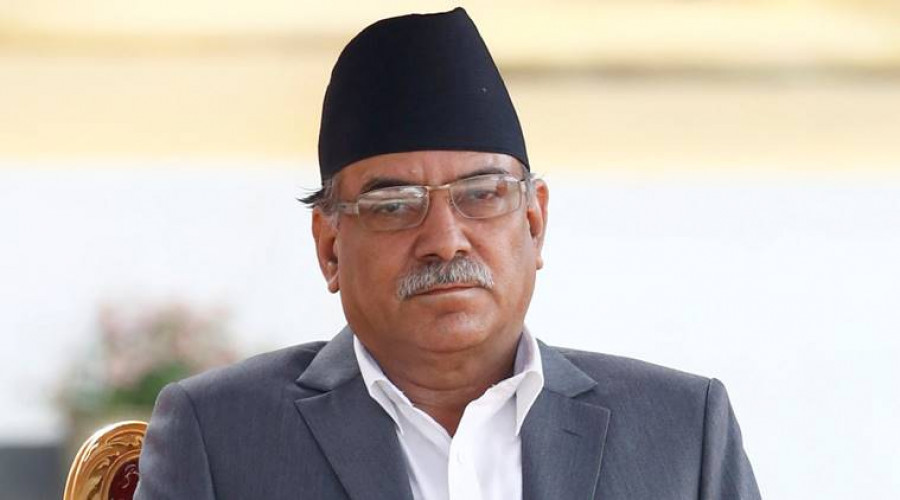National
Dahal owns up to insurgency-era mistakes and pledges to deliver transitional justice
The major parties—Nepali Congress and Nepal Communist Party—are on the same page when it comes to an early conclusion to the drawn-out transitional justice process.
Binod Ghimire
Nepal Communist Party Co-chair and former prime minister Pushpa Kamal Dahal, who led the decade-long ‘people’s war’, said on Thursday that he takes the responsibility for “all the positive and negative implications of the insurgency” and that he is ready to face action for his mistakes.
Dahal was speaking at a programme organised by the National Human Rights Commission, where it invited cross-party leadership to discuss ways to take Nepal’s long-drawn transitional justice process forward.
The former Maoist leader said that unlike in the past, when the focus of the parties was on blaming each other, today’s two major parties—the Nepal Communist Party (NCP) and the Nepali Congress—are on the same page and have a common voice: “an early conclusion to the process”.
“All major parties have realised that we cannot afford to delay the process anymore,” said Dahal. “The process will be expedited by taking all concerned parties forward together.”
Nepal’s transitional justice process has been characterised by one feature: one step forward, two steps back.
In the 13 years since the signing of the Comprehensive Peace Agreement, which ended the decade-long conflict, no tangible progress has been made when it comes to transitional justice, largely due to a lack of political commitment. Nearly 17,000 people were killed and 1,300 disappeared in the conflict.
Over the years, victims’ fear has grown that justice will never be delivered, even as human rights defenders and the international community continued to build pressure on the Nepal government to conclude the process.
Though the Truth and Reconciliation Commission and the Commission of Investigation of the Enforced Disappeared Persons were formed in 2015, both mechanisms did little except to collect complaints from victims in their four-year tenure.
Both commissions have been vacant since their chairpersons and members were relieved of their duties on April 13 through an amendment to the Enforced Disappearances Enquiry, Truth and Reconciliation Commission Act—2014 in February this year.
A committee formed to select officials for the two transitional justice bodies has yet to do its job. Though the ruling and opposition parties have reached an agreement on appointing officials, conflict victims have expressed their unhappiness at the way the entire transitional justice process has been politicised.
“It is wrong to solely blame the two commissions for their failure. We [political parties] must accept that we are equally responsible for the poor show,” said Dahal.
Nepali Congress leaders echoed Dahal.
Sher Bahadur Deuba, president of the Nepali Congress and former prime minister, said that all parties have extensively discussed the issue and now have a unanimous voice that the victims must get justice.
“I want to assure you that our transitional justice process will be exemplary, as it will address all the concerns of the victims,” said Deuba.
The peace agreement in 2006, which ended the decade-long conflict, had broadly set three tasks—socio-political transformation; integration and rehabilitation of the Maoist combatants; and justice for the victims of human rights violations—collectively called the “peace process”. With such a crucial component of the peace deal—justice for victims of human rights violations—outstanding, Nepal cannot claim to have completed the peace process.
Even though Nepal has, on several occasions and on various platforms, boasted of its “homegrown peace process”, victims remain unhappy with the pace of the process, which they blame on the political parties.
The National Human Rights Commission, which organised Thursday’s gathering, said it was high time parties found a way to take the stalled transitional justice process forward for completing the peace process.
“The commission took this initiative to find ways to take the stalled transitional justice process forward,” said Anup Raj Sharma, chairman of the commission. “We hope the parties will seriously internalise the pain of the victims and facilitate a credible transitional justice process.”
The interaction was an initiative taken by the constitutional human rights watchdog to build pressure on the top political leaders to cooperate in concluding the process by adhering to international standards and practices and the 2015 Supreme Court verdict.
Despite calls from human rights defenders and the international community, the government has yet to amend the transitional justice law in line with the court’s landmark verdict, in which it struck down a dozen provisions that would grant amnesty to the perpetrators of serious human rights violations committed during the war.
The government in March formed a five-member recommendation committee led by former chief justice Om Prakash Mishra to select officials for the two commissions. The Mishra-led panel is independent in legal terms, but the major parties want their pick in the commissions’ leadership.
“The new session of Parliament needs to commence for the amendment process to begin, which will take time. Therefore, the appointments will cone before the amendment,” said Nepali Congress leader Minendra Rijal, who represents the party in negotiations on transitional justice.
Victims of the decade-long insurgency, human rights defenders and international human rights organisations, however, have been demanding that the government amend the Act before appointing officials to the commissions to ensure early delivery of justice.
“We aren’t asking any government job or money; our only demand is justice for the suffering we faced,” said Bhawana Bidrohi, who was tortured at the hands of security forces during the war. “We want to warn the government and the political parties that there could be another armed conflict if we are neglected.”




 11.12°C Kathmandu
11.12°C Kathmandu














